|
|
 |
Gregor Strasser and below right at a party meeting with Adolph Hitler
The brothers, Gregor and Otto Strasser
were at the beginnings
of Hitler’s National Socialism when they all had their own individual expectations of what Nat. Soc. should mean and seek to achieve.
Gregor espoused the socialist, component of the
movement while Otto perceived
himself as a social democrat. As Adolph
consolidated his hold he found it expedient to liquidate Rohm in June 1934 and, for good measure, had Gregor murdered at the same time. Otto fled to Austria and was hounded across Europe to Portugal and Bermuda.
By 1941, Otto was offered asylum
by the Canadian Govt. on the
understanding that he would support himself and he moved to Montreal before adjourning to Clarence and Paradise, Nova Scotia where he lived until 1955
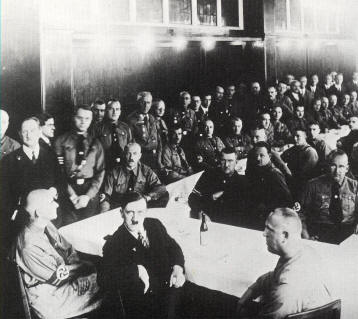
Otto Strasser's Sojourn in Paradise
Otto Strasser was first brought to my attention by Norman Morse who was my colleague at Acadia University. Norman.
advised that Otto Strasser had spent the war as his neighbour, in Paradise N.S., during the 1940s.
Some time in the late 60s, the CIIA branch at Acadia University brought in a speaker, J. Munro, ( who, in incidental
conversation, alluded to the fact that he had had access to papers held in Ottawa dealing with Strasser's sojourn in Nova
Scotia including complaints Otto had on shortage of funds to maintain his lifestyle.
There were two brothers, Gregor and Otto Strasser, who were at the foundation of Hitler's National Socialism
in the 1920s when they all had their own individual expectations of what National Socialism should mean and seek to achieve.
Gregor espoused the socialist, (maybe Marxist? Bearing in mind there were many in Europe sympathetic to a `Leninist' approach
following their experiences in WWI),) component of the National Socialist movement.
( Alan Bullock's Hitler has considerable reference to Gregor in the early chapters.) At one stage,
Gregor was invited to assume the office of Vice-Chancellor and, under the instruction from Adolph Hitler, declined the post.
As Adolph consolidated his hold on the party, he found it expedient to liquidate Rohm in June 1934 and for good
measure had Gregor murdered at the same time.
Otto fled, first to Vienna, then Switzerland, France as the collapse took place and Vichy, Portugal, Bermuda
and Montreal by way of Saint John, New Brunswick , before taking up residence in Nova Scotia. First, at Clarence, under the
aegis of Adolph Schmidt (a Czech), and then at Paradise by 1942, where he remained until 1955. In a July 15th 1939 New Statesman
article, Strasser laid out, with accuracy, Hitler's campaign for the conquest of Poland launched on 1 st Sept.
Strasser became an interest of Douglas Reed who wrote two books about him, Nemesis (1940) and Prisoner of Ottawa
(1953) -Jonathan Cape, London.
Otto Strasser arrived in Bermuda on the SS Excambion on 9 October 1940 under the name of Otto Bostroem, using
a Swedish passport, and left Bermuda on 3 April 1941 for St. John, New Brunswick, under the name Oswald Bostock . It is possible
that Strasser's presence may have been an embarrassment to the authorities in Bermuda. He earned enough to support himself
by writing articles for American newspapers and on this lived in reasonable comfort. Strasser was interviewed by H. Montgomery
Hyde who refers to him in Secret Intelligence Agent. There was also an `encounter' with H.G. Wells to which
Reed refers in Prisoner of Ottawa, (pp200-207), without offering explicit detail or explanation beyond an inference
of truculence on the part of H.G. Wells and incomprehension on the part of Strasser .
Horst Augustinovic, of Bermuda, has supplied the following from his notes: "In my searches through the
Bermuda Archives I once came across a reference to Dr. Otto Strasser arriving on the SS 'Excambion' and staying at the Everest,
a guest house that used to be located on Church Street in Hamilton - now the location of the MarketPlace supermarket. According
to those notes he was 'typical German, blue-eyed, blond, stocky, bows from the waist and clicks his heels at the slightest
provocation'. He believed Hitler made a mistake in not attacking Great Britain last June because he is 'mentally unable to
depart from his well-tried plan of dealing with the weakest first'. In December H.G. Wells arrived to meet with Strasser.
They discussed a new post-war order, without religion and nationalism, only the 'order of science'. Apparently, Strasser could
not agree as he was Catholic."
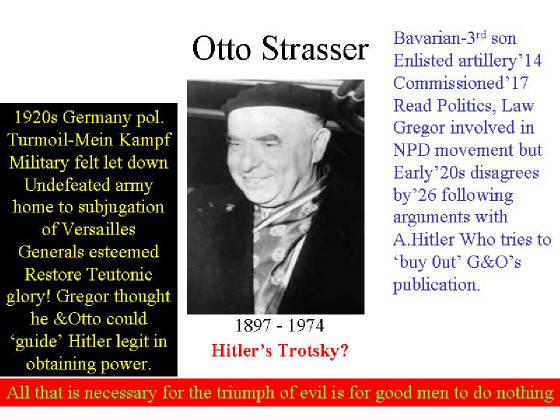
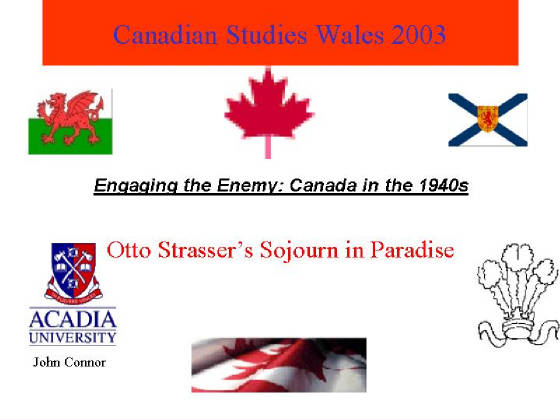
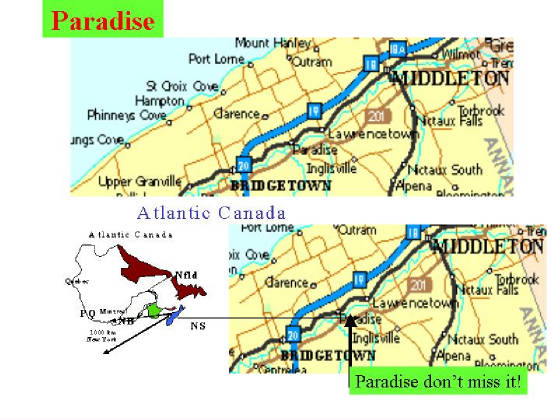
Strasser was admitted to Canada on the understanding that he would be self-supporting and generally maintain the peace.
In the beginning the former requirement was accomplished by generating newspaper articles and some assistance from his brother,
Bernard, in Minnesota. In time, however, Strasser found increasing difficulty in 'placing' his articles and revenue from this
source became quite small. With regard to keeping the peace, there was little prospect that disturbance would arise in the
rural environment of western Nova Scotia. It should be borne in mind that the population in the immediate `area' of Paradise
was, and is, extremely sparse. Most of the local residents would never have heard of Otto Strasser far less have knowledge
of his sometime significance although his presence would have been instantaneously noted. In the context of the time of his
arrival, war propaganda would have been significant. There would hardly have been a family that would not have had some member
involved with the war effort. One might conjecture that Strasser was fortunate to have got established before the Dieppe Raid
of August 1942. It was not in the nature of the local populace to question the presence of anyone in their midst; certainly
not any who could not be seen to be doing anything beyond going for walks and being extremely polite. In Paradise, Strasser
was befriended by the Bishop family who ran a general store above which was a rented apartment. This became Otto Strasser's
place of abode for the next thirteen years.
There are now two sets of people who can recall actually seeing Otto in the Paradise area: those who were very young at
the time but are now in the 60-70 age bracket and with whom Strasser had little or no dealings. The one exception is Alan
Bishop, now in his seventies, who remembers him well and maintains a `file' of memorabilia from the period. Strasser lived
in an apartment above the general store run by Wilfred Bishop, Alan's father. Secondly, taking in the towns of Annapolis Royal
and Middleton, there was a small number of local social elite who were hospitable. Names such as Hicks, Moir, Lewis, Cotterdon,
Bishop, have been noted. A discussion with a sometime member of the Canadian Provost Corps led him to an assumption that Strasser
was expected to remain within Annapolis County. He went on to elaborate to the effect that, "if he found Otto outside the
county he was to be shot but not killed"- this latter was taken with a considerable grain of salt!

|
 |
|

|
 |
|
Nothing of any great significance arises in his life after the return to Germany. The German people had `moved
on' and Otto Strasser did not figure as part of their social development. Probably, their greatest concern focussed on being
at the geographic edge of the East West confrontation. In 1957 he returned to Canada for a visit and hankered after his old
abode in Paradise to the point of asking whether the current tenant would sublet for two weeks. The Cotterdons, from Annapolis
Royal, tried to call on him in Munich in 1969 but he was `out of town'. They were surprised by the security precautions encountered
in order to gain access, even to the fact that he was `out of town, and concluded he was obsessed by a fear that he could
be assassinated. No great note seems to have been taken of his death in 1974 at the age of seventy-seven.
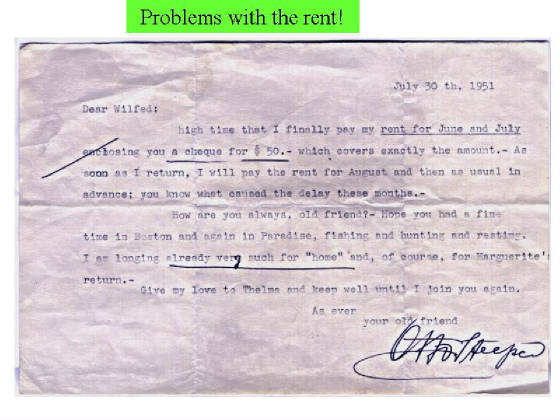
Given the urge to return to Nova Scotia one must conclude Otto Strasser was happy during his stay. He lived
well albeit his circumstances were far from affluent to the point of being unable to pay his twenty-five dollar a month rent
on occasion. He had a circle of friends who treated him well; a `resident' secretary, Marguerite de Pannelli and was visited
from time to time by Cecille von Goetz, described as "a startling slim tall blond", who would come up from Washington D.C.
In correspondence, she refers to him as "der Fuhrer". There is a newspaper clipping from the Washington Post(?) written by
Jack Anderson in place of Drew Pearson viz:"Washington Note re raid
on "Nazi HQ" -1/10/1964. " and indicates that a Barbara von Goetz was one of the subjects of the investigation. The
article concludes with, "Note Barbara's sister, Joan Cecile von Goetz, went to Germany in 1945 to work briefly for
the Allied Military Security Board. In 1961, she renounced her US citizenship and sought to be declared stateless. She
claims to represent Dr Otto Strasser, a neo-Nazi leader. "
In his flight from Europe, a wife and two children were left behind in Switzerland but no effort appears to
have been made to re-unite when the war came to an end.
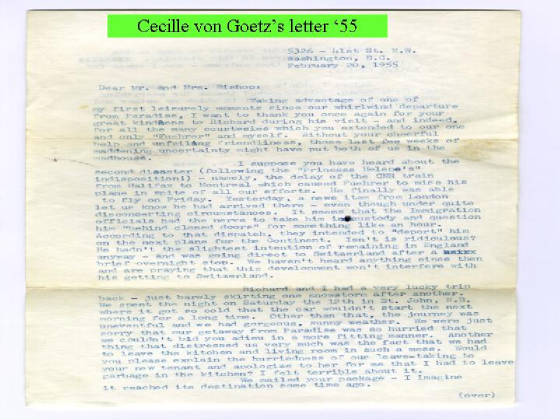
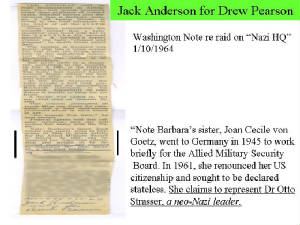
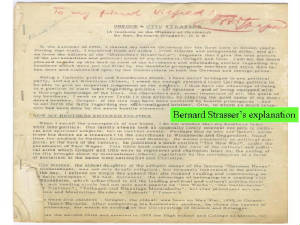
|
|
 |
|
|
|
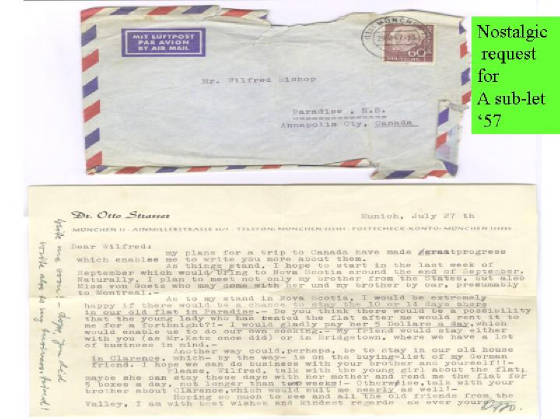
The Strassers may have felt that they were `almost' in control of the Nazi party in the mid- 1920s.
Otto seems to have 'misread' Hitler believing he was the personality capable of leading to the establishment of 'National
Socialism' without knowing/understanding what this might mean in actual experience or how it might be developed. He broke
with the Nazi establishment upon realising the nature of their objectives and methods in the late 1920s. Gregor stayed on
believing he could influence events. It is ironic that Gregor was responsible for introducing Goebels to Hitler's inner circle.
There is a seventeen page typescript pamphlet written by Strasser's older brother, Bernard, a Benedictine then in Minneapolis,
on the family's origins, along with an apologia for Otto and Gregor, and signed by Otto (translated by C. von Goetz).
Otto Strasser did not recognize the quantum changes in socio/political outlooks between the 1930s and 1945. Even as late
as 1969 he was still obsessed by an apprehension that there were forces about trying to assassinate him in Munich! In the ultimate, Strasser's claim to fame is that he and his brother were once on terms of intimate
contact with Hitler, Goering, Himmler, Streicher, and Goebbels et al of that ilk. He did write a dozen books/pamphlets on
his cause (his perception of a socialized Germany) and Douglas Reed wrote two in support of Strasser. About every ten years,
since 1950, a journalist, (Macleans, Atlantic Advocate, CBC, Halifax Herald) produces an article on his 'hidden' years in
Nova Scotia from 1942-55.
Acknowledgements
The above was prepared for presentation at the Canadian Studies in Wales Group Conference at Gregynog
2003. The assistance of:
Alan Bishop, Paradise, Nova Scotia;
Clara Jefferson, Wolfville;
Horst Augustinovic per the Royal Gazette Bermuda;
Mary Macleod of the Acadia Univ. Library
was most graciously given and gratefully received. J.C.
Post Scriptum
The above is a partial reconstruction of a previous site dealing with the subject of Strasser's stay in Nova Scotia. Manfred
Becker of Toronto has asked for some elaboration of the limited detail. I replied in part as follows:
Dear MB,
My interest arose from ‘passing references’ from a colleague Norman Morse and an invitation to make
a short presentation to the Canadian studies group associated with the Welsh universities. Essentially, I focused on the contrast
between the man’s associations/involvements in Germany as national socialism evolved and the incongruity of the
life he had to live after 1942. I put this together about four years ago for a thirty minute illustrated presentation out
of which a short web site was created. I do not know whether the later is still circulating in cyber space but I ought to
have a trellix copy on a disc or hard drive. I will attach a copy of the short script that I can put to hand immediately.
It would be interesting to know whether the ‘resident’ secretary’, Margueritte de Pannelli
and Cecille von Goetz (described as ‘a startling blond’who would come up from Washington D.C.) are still
alive and whether the children (in Switzerland?) were ever re –united with their father.
I have some material on file though not a great deal but not short on references but these may be of questionable reliability-for
example I would not be surprised to learn that Prof. Donald Schurman, now retired and living in Victoria BC, may have had
face to face conversation(s) with OS when he returned to Acadia to complete his degree having been a bomber pilot with the
RCAF.
J.C.
the above gave rise to further inquiry responded, in part,viz: This ( the Wales presentation), of course, was confined to
the ironic situation, of ‘Otto’ s Sojourn' in N.S.’ and its circumstance. As I state there is
nobody left who was on terms of intimate knowledge of the man when I carried out the search- the nearest to fitting such a
description. Was E. Allan Bishop per his recollection of his father Wilfred’s dealings with OS.
Strasser must have been like a fish out of water in their midst-he would have stuck out like a sore thumb taking long
walks when the weather was fair and probably going over in his mind material for the next piece of journalism and/or, as allied
achievement improved, what he would do to restore Germany to its former glory. He had nothing in common with the populace
around him apart from the fact that he had to live in their midst and apparently on a relatively falling income as his writing
declined in demand. To say the population of Paradise (N.S.) is sparse is probably to engage in hyperbole for it would not
have numbered more than a couple of hundred. Everybody around him would have known his name and perhaps from whence he came
but few would have had any awareness of any relevance/significance he might have had twenty years previously or, as he eventually
had to realise, how inflated it was in his own mind. Though, having said this, it is clear that the administrations in London
and Washington were not prepared to risk any potential he might have had and doubtless between 1945-55 there was communication
between Ottawa, who wanted to get rid of him, and Washington and London who would be keen to avoid any disturbance in the
German political situation. Moreover, the ‘briefing books’ probably would have noted the ‘leftist
attitudes’ associated with the Strasser name. Presumably, the former Mayor of Cologne(Adenhauer) might not have
been complacent having OS around during the early days of the Bonn administration. Such conjecture might be verifiable now
that access to govt. documents is possible in W’ton and London as well as Ottawa under the thirty year rule.
Norman Morse was born in 1920-at the time OS arrived in Paradise he was training for anti-submarine flying with the RCAF
on the Pacific coast. After 1945 he returned to a post at Acadia Univ and would have frequently visited his family in Paradise.
He could identify OS but never spoke to him. Norman now lives in retirement in Mahone Bay N.S.
I believe J. Munro may have been a political assistant in Ottawa- when we met I recall reference to a book in preparation
on Lestor Pearson – whether it was completed I know not and I remember nothing of his address apart from anecdote
from Pearson’s election campaign. (J.A. Munro edited the Pearson Papers)
Adolph Schmidt I think was a businessman in Montreal who had befriended Otto allowing him use of the house in Clarence-
I have a ‘sense’ that the Bishop family may have acquired the property though how I got the idea I do
not remember.
I had a copy of the New Statesman article which I may have obtained from the Royal College of Surgeons in Edinburgh-(
I happened to be in Scotland when preparing the presentation)-however, it should be accessible through a copy right library
and probably one of the internet sites.
The Prisoner of Ottawa has been read and I have a ‘sense’ that a made for television production was
produced from its ‘situations’ without explicitly naming the principal as Strasser. As you say its not
such a readable tome as to warrant keeping on a bookshelf for future reference. My impression is that it was concocted to
order and I would be surprised if it made money. I would have reservations with respect to an ‘Ottawa welcome’.
I am more inclined to a view of a ‘noblesse oblige-force majeure’ situation to take stress off Bermuda
with Ottawa being obliged to throw crumbs to him to keep him quiet. What could you do with him-technically he was an enemy
alien for whom the procedure in those days was to expropriate his property (as the British Govt. took BP from the Deutche
Bank in 1914) and place him in internment. But OS had no assets and appeared as a war refugee. As far as Ottawa was concerned
he was a white elephant that had to be fed but with no prospect of return.
Bernard Strasser was a Benedictine monk-there should not be any descendants living in Minnesotta- there is a chance that
Otto’s progeny are still alive though how much they might know in detail could be difficult. There was a sister
and a younger brother who was killed in Russia in WWII. The Germans have a reputation for keeping meticulous records- there
may be something in the Wehrmacht’s archives wherever these may be located.
The 1940-50s social elite of the Annapolis Valley outlasted analogous sets in North American societies but like Yeats’
O’Leary they are all now in the grave or non compos mentis.- a review of the social columns of the several local
newspapers of the day would afford some idea of who they were and the things they might do in public. Whether there might
be explicit reference to OS might be indicative of his status. I suspect that he might have been ‘cultivated’
by the ‘elite’ after the war though perhaps viewed with suspicion during the hostilities. While in N.S.
Otto is pleading poverty – even goes delinquent on his rent- but there is no reference to straitened circumstance
in Munich. Within two years he can afford a nostalgic return to Nova Scotia. Which raises the question of whether he might
have been able to realise family assets in W. Germany and/or whether the FDR(?) provided a pension.
The Nowlan papers are un catalogued in the Acadia Library- in a very cursory scan I found a letter from Don Schurman (then
a student) inviting GN to a debate that might include OS as a speaker. Margaret Conrad’s biography of Nowlan refers
to Strasser in one line, ‘fancy wanting to leave Paradise’! Munro’s ‘finding’
of Strasser could, of course, have arisen during his research for the Pearson book either when LBP was an official in External
Affs. Or when he was Minister - Munro ought to be alive still.
The ‘femmes fatales’ are interesting with respect to their ‘involvement’. In terms
of their provenance and location after 1955. Margueritte di Pannelli was not a N. American. I’ve never heard of
any association on the part of Cecille von Goetz with Lincoln Rockwell. What the ‘accommodation arrangement was
in Paradise might prove intriguing. Di Pannelli did not leave with Otto although she may have been the second party returning
with CvG to Washington. J.C.
|
|
|
 |

